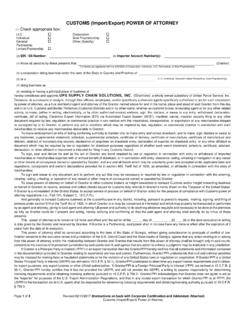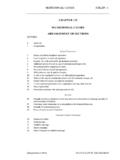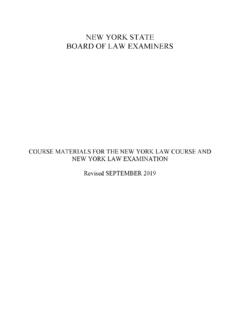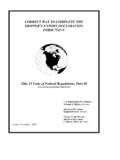Transcription of General Durable Power of Attorney Introduction - …
1 General Durable Power of Attorney Introduction Title 46 through 46 , known as the Revised Durable Power of Attorney Act, (RDPAA) was enacted in 2000, replacing Title 46:2B-8 and 46:2B-9, which had been enacted in 1971 as an Act concerning the effect of death, disability or incapacity of a principal upon a Power of attorney1. The RDPAA was not intended to and did not supersede the provisions of Title 46:2B-10 et seq. relating to banking transactions under a Power of Attorney . Instead, it expressly complemented these provisions. Since its enactment, the RDPAA has not been modified except for the addition of section 46 to gratuitous transfers and In 2006, the National Conference of Commissioners on Uniform State Laws (NCCUSL) approved and recommended for enactment in all states, the Uniform Power of Attorney Act (UPOAA)3, in response to a national review of state Power of Attorney legislation.
2 As stated in the Prefatory Note, NCCUSL s review revealed growing divergence among states statutory treatment of powers of Attorney on such topics as the authority of multiple agents and of a later-appointed fiduciary or guardian; the impact on the Power of Attorney of the dissolution or annulment of the principal s marriage to the agent; the activation of contingent powers; the authority of the agent to make gifts; and the standards of conduct and liability for the agent. NCCUSL also discovered that more than seventy percent of the states surveyed agreed that a Power of Attorney statute should include provisions not in the then current uniform law.
3 These provisions included, among other things: a requirement that gift making authority be expressly stated in the grant of authority; a default standard for fiduciary duties; protection of the reliance of other persons on a Power of Attorney ; and provision for revoking a spouse-agent s authority upon the dissolution or annulment of the marriage to the principal. The UPOAA addresses these concerns. The enactment of the UPOAA, and the recent amendment to the New York Durable Power of Attorney law4, prompted this Commission to evaluate the need for revision to the current New Jersey Power of Attorney statutes.
4 Attorneys proficient in 1 This earlier act is noted as being similar to 5-501 of the Uniform Probate Code which provision is part of a series of provisions that were amended by NCCUSL in 1979 and enacted as part of the Uniform Durable Power of Attorney Act. 2 That section provides that a Power shall not be construed to authorize gratuitous transfers of the principal s property by an agent to that agent or others except to the extent expressly authorized by the principal, and that an authorization to perform all acts generally (or similar words) is not an express or specific authorization to make gifts.
5 3 The UPOAA replaced the original Uniform Durable Power of Attorney Act, which had been amended last in 1987, and had at one time been followed, according to NCCUSL, by all but a few jurisdictions. The UPOAA also superseded the Uniform Statutory Form Power of Attorney Act, and sections of the Uniform Probate Code. 4 New York s Chapter 644, signed into law at the beginning of 2009 and effective September 1, 2009, was the result of eight years of study by the New York State Law Revision Commission. Chapter 644 amends New York s General Obligations Law to provide significant reforms to the use of powers of Attorney in New York. durpowattDTR120709 trusts and estate law and elder and disability law were consulted for comment.
6 The chairs of the New Jersey State Bar Association, Real Property, Trust and Estate Law Section, and the State Bar Elder and Disability Law Section, the legislative co-coordinators of the State Bar Elder and Disability Law Section, the President of the New Jersey Chapter of the National Association of Elder Law Attorneys (NAELA), and individuals in the title and banking industries were solicited for their comment and review. The consensus was that certain aspects of the UPOAA would be useful in New Jersey although a statutory form of Power of Attorney similar to that provided in the New York statute would not be helpful.
7 The proposed revision focuses on several areas. Consistent with the UPOAA, a Power of Attorney is now Durable unless otherwise expressly stated. Consistent with New York s law, the UPOAA, and current 46:2B-10, a Definitions section has been added, defining key terms, including but not limited to agent , financial institution , incapacity and principal. The term Attorney in fact has been replaced with the term agent , as used in the banking Power of Attorney provisions and consistent with the UPOAA. A majority of commenters agreed with the conclusion of NCCUSL, that use of the term agent helped eliminate any confusion in the lay public about the meaning of Attorney in fact.
8 Unlike New York s law and the UPOAA, no form of Power of Attorney is provided in the New Jersey statute. However, the proposed revision does set forth drafting guidelines for the contents of a form of Power of Attorney (46 ) as well as a form of affidavit to be signed by an agent in support of the assertion that the Power of Attorney has not been revoked or terminated (46 ). The standards for determining the validity of a Power of Attorney are expressly set forth at section 46 The revised statute further clarifies that the provisions regarding the recordability of a Power of Attorney , as set forth in 46 are not altered by the revision.
9 New section 46 sets forth the scope of the fiduciary duty and responsibility of the agent, incorporating current section 46 and concepts from the UPOAA, as well as commenters suggestions. Guidelines for co-agents and successor agents are clarified in section 46 and an agent is now required to disclose the agent s relationship with the principal in any transaction where the agent acts pursuant to a Power of Attorney and the handwritten signature of the agent or principal is required (46 ). Proposed section 46 merges current section 46:2B-13 of the banking Power of Attorney provisions with new language pertaining to the acceptance of powers of Attorney by third parties generally.
10 The proposed new section specifically provides that no third party , including a financial institution, may refuse to accept or rely on a Power of Attorney solely because it is not on a form prescribed by the third party to whom the Power is presented. Nor may a third party , including a financial institution, refuse to accept or rely on a Power of Attorney solely because of a lapse of time since the execution of the Power . 2 durpowattDTR120709 The mechanisms for revoking and terminating a Power of Attorney are set forth at section 46 Liability of a third party acting in reliance on a Power of Attorney is now set forth in section 46 Notably, the liability of an agent is not addressed in the current statute.








